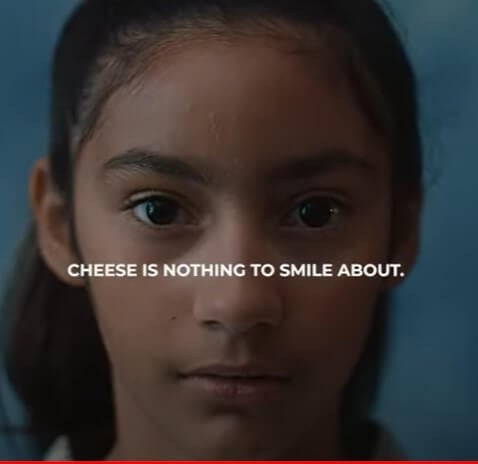Few things can wipe a smile from someone’s face faster than the thought of animal suffering, so why do adults still ask kids to say “cheese” before snapping a photo? As children across the country line up for school picture day this spring, PETA is calling on the compassionate members of Gen Alpha—who are increasingly ditching dairy in favor of vegan options—to replace the outdated, anti-animal prompt with one that is inclusive and doesn’t trivialize cruelty to animals. The group is launching a thought-provoking new video appeal that reminds viewers what “cheese” really means: “calf-cow separation,” “repeated forced impregnation,” and “dehorning and tail docking.”
In a letter sent to several school photo companies, PETA urges them to stop imposing the problematic phrase on kids and instead focus on using animal-friendly wording that truly makes young people smile, including “please,” “bees,” and “nutritional yeast” (an ingredient used to make delicious vegan cheeses).
“No one would feel like smiling if you asked them to say, ‘Babies slaughtered for veal,’ but that’s precisely what happens in the dairy industry, which routinely snatches newborn calves away from the anguished mother cows it exploits as milk machines,” says PETA Executive Vice President Tracy Reiman. “PETA is encouraging this empathetic generation and people of all ages to call the shots by using animal-friendly language we can all smile about.”
Gen Alpha is sending the demand for vegan food skyrocketing. One study finds that 31% of them are consuming oat milk and other animal-free foods several times a week. Even studies funded by the dairy industry, including one that shows that up to 34% of kids are asking their parents to buy them vegan foods, noted that the generation is fueling a massive surge in the popularity of dairy-free products.
PETA’s investigations into dairy facilities have found workers electroshocking cows in the face, hitting them with poles and a cane, and abusing them in other ways. Once cows’ bodies wear out after repeated pregnancies, they’re sent to slaughter. Each person who goes vegan saves nearly 200 animals each year and improves their own health, since vegans are less prone to heart disease, cancer, diabetes, and strokes.
PETA points out that words matter, and as our understanding of social justice evolves, our language evolves along with it. Just as it became unacceptable to use racist, homophobic, or ableist language, phrases that trivialize cruelty to animals will vanish as more people begin to appreciate animals for who they are and start removing speciesist language from their vocabulary.
PETA’s previous work to replace other outdated, speciesist phrases include encouraging the baseball world to swap the term “bullpen” for the bovine-friendly “arm barn” and for everyone to adopt new animal-friendly idioms such as “feed two birds with one scone” and “bring home the bagels.”
The new video—which was codirected by Christian Carl and Jon Walley with Philadelphia-based production company Format—already has nearly 700,000 views online and counting.
PETA—whose motto reads, in part, that “animals are not ours to eat”—points out that Every Animal Is Someone and offers free Empathy Kits for people who need a lesson in kindness. For more information, please visit PETA.org or follow the group on X, Facebook, or Instagram.
The post Don’t Say ‘Cheese’—Say ‘Peas’! PETA Asks Kids to Ditch Outdated Photo Prompt appeared first on PETA.

